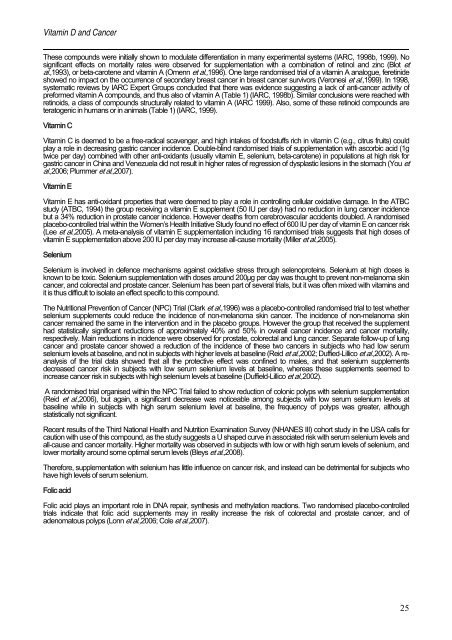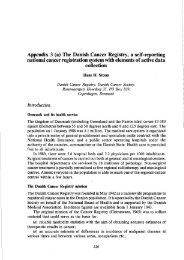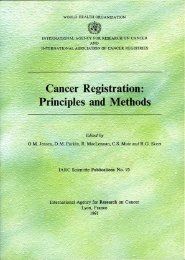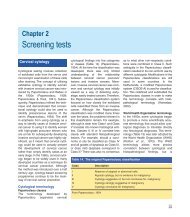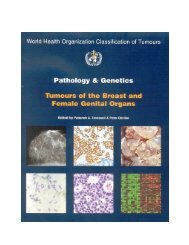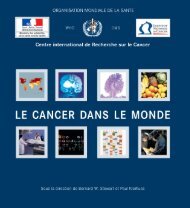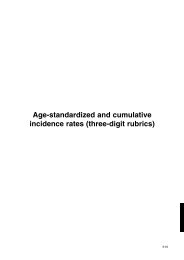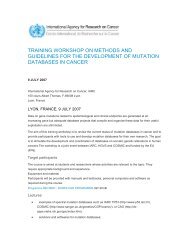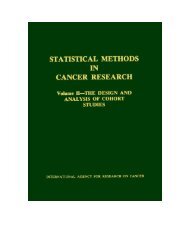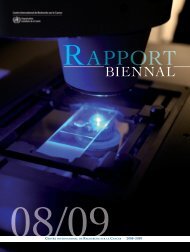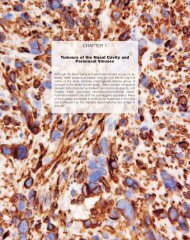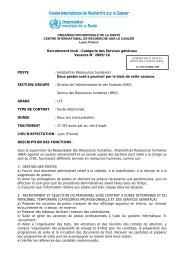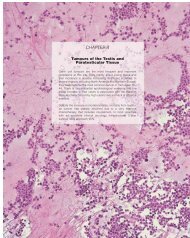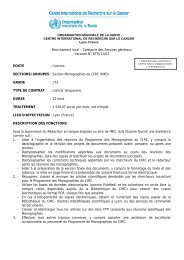You also want an ePaper? Increase the reach of your titles
YUMPU automatically turns print PDFs into web optimized ePapers that Google loves.
Vitamin D and Cancer<br />
These compounds were initially shown to modulate differentiation in many experimental systems (<strong>IARC</strong>, 1998b, 1999). No<br />
significant effects on mortality rates were observed for supplementation with a combination of retinol and zinc (Blot et<br />
al.,1993), or beta-carotene and vitamin A (Omenn et al.,1996). One large randomised trial of a vitamin A analogue, feretinide<br />
showed no impact on the occurrence of secondary breast cancer in breast cancer survivors (Veronesi et al.,1999). In 1998,<br />
systematic reviews by <strong>IARC</strong> Expert Groups concluded that there was evidence suggesting a lack of anti-cancer activity of<br />
preformed vitamin A compounds, and thus also of vitamin A (Table 1) (<strong>IARC</strong>, 1998b). Similar conclusions were reached with<br />
retinoids, a class of compounds structurally related to vitamin A (<strong>IARC</strong> 1999). Also, some of these retinoid compounds are<br />
teratogenic in humans or in animals (Table 1) (<strong>IARC</strong>, 1999).<br />
Vitamin C<br />
Vitamin C is deemed to be a free-radical scavenger, and high intakes of foodstuffs rich in vitamin C (e.g., citrus fruits) could<br />
play a role in decreasing gastric cancer incidence. Double-blind randomised trials of supplementation with ascorbic acid (1g<br />
twice per day) combined with other anti-oxidants (usually vitamin E, selenium, beta-carotene) in populations at high risk for<br />
gastric cancer in China and Venezuela did not result in higher rates of regression of dysplastic lesions in the stomach (You et<br />
al.,2006; Plummer et al.,2007).<br />
Vitamin E<br />
Vitamin E has anti-oxidant properties that were deemed to play a role in controlling cellular oxidative damage. In the ATBC<br />
study (ATBC, 1994) the group receiving a vitamin E supplement (50 IU per day) had no reduction in lung cancer incidence<br />
but a 34% reduction in prostate cancer incidence. However deaths from cerebrovascular accidents doubled. A randomised<br />
placebo-controlled trial within the Women’s Health Initiative Study found no effect of 600 IU per day of vitamin E on cancer risk<br />
(Lee et al.,2005). A meta-analysis of vitamin E supplementation including 16 randomised trials suggests that high doses of<br />
vitamin E supplementation above 200 IU per day may increase all-cause mortality (Miller et al.,2005).<br />
Selenium<br />
Selenium is involved in defence mechanisms against oxidative stress through selenoproteins. Selenium at high doses is<br />
known to be toxic. Selenium supplementation with doses around 200µg per day was thought to prevent non-melanoma skin<br />
cancer, and colorectal and prostate cancer. Selenium has been part of several trials, but it was often mixed with vitamins and<br />
it is thus difficult to isolate an effect specific to this compound.<br />
The Nutritional Prevention of Cancer (NPC) Trial (Clark et al.,1996) was a placebo-controlled randomised trial to test whether<br />
selenium supplements could reduce the incidence of non-melanoma skin cancer. The incidence of non-melanoma skin<br />
cancer remained the same in the intervention and in the placebo groups. However the group that received the supplement<br />
had statistically significant reductions of approximately 40% and 50% in overall cancer incidence and cancer mortality,<br />
respectively. Main reductions in incidence were observed for prostate, colorectal and lung cancer. Separate follow-up of lung<br />
cancer and prostate cancer showed a reduction of the incidence of these two cancers in subjects who had low serum<br />
selenium levels at baseline, and not in subjects with higher levels at baseline (Reid et al.,2002; Duffied-Lillico et al.,2002). A reanalysis<br />
of the trial data showed that all the protective effect was confined to males, and that selenium supplements<br />
decreased cancer risk in subjects with low serum selenium levels at baseline, whereas these supplements seemed to<br />
increase cancer risk in subjects with high selenium levels at baseline (Duffield-Lillico et al.,2002).<br />
A randomised trial organised within the NPC Trial failed to show reduction of colonic polyps with selenium supplementation<br />
(Reid et al.,2006), but again, a significant decrease was noticeable among subjects with low serum selenium levels at<br />
baseline while in subjects with high serum selenium level at baseline, the frequency of polyps was greater, although<br />
statistically not significant.<br />
Recent results of the Third National Health and Nutrition Examination Survey (NHANES III) cohort study in the USA calls for<br />
caution with use of this compound, as the study suggests a U shaped curve in associated risk with serum selenium levels and<br />
all-cause and cancer mortality. Higher mortality was observed in subjects with low or with high serum levels of selenium, and<br />
lower mortality around some optimal serum levels (Bleys et al.,2008).<br />
Therefore, supplementation with selenium has little influence on cancer risk, and instead can be detrimental for subjects who<br />
have high levels of serum selenium.<br />
Folic acid<br />
Folic acid plays an important role in DNA repair, synthesis and methylation reactions. Two randomised placebo-controlled<br />
trials indicate that folic acid supplements may in reality increase the risk of colorectal and prostate cancer, and of<br />
adenomatous polyps (Lonn et al.,2006; Cole et al.,2007).<br />
25


